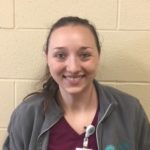Nurse Builds Trust With Young Boy to Help Him Heal

This story was selected as a winner during our 2017 summer story contest and was submitted by Grace Becker, Licensed Practical Nurse for KVC Prairie Ridge Hospital.
In my role, I work with pre-adolescent youth age 13 and under at KVC Prairie Ridge Hospital. These youth have been struggling with depression, anxiety, trauma, suicidal ideation, thoughts of violence and other interpersonal struggles. As a nurse, I administer the prescribed medications to the children, work with the doctors, interact with the children in care, monitor them for prescription side effects and help anytime a child becomes dysregulated or is struggling to manage his or her emotions and behaviors.
Children can get dysregulated when they become upset and don’t have a way to express their frustration. They may yell, damage property or even hurt themselves or others. They might be upset about something a peer said or that they can’t do something right when they want to. Many children who come to Prairie Ridge have experienced abuse from someone they know and trusted and need to heal from that trauma. Other children are upset about their living situation and don’t feel that they need to be at a psychiatric hospital. So when children get dysregulated, we have trained staff to help address their concerns and work with them to get to a calm place.
A 10-year-old boy named Johnathan had been significantly abused by his parents. They chained him to a bed for long periods during the day and this abuse went on for months, if not a year. His siblings also lived in the house but they were treated well and not abused. Jonathan was chained because he was getting in the refrigerator and “eating too much.” One day, Jonathan told an adult about the abuse and the police removed all of the siblings from the home. He told me that his siblings hated him for telling and that it was his fault they were also removed from the home.
Therapists, counselors, and doctors worked with Jonathan to help him know that he was a great kid and he didn’t cause any of this. He came to KVC very distrusting of everyone and he wouldn’t make eye contact with anyone. His doctor prescribed him a needed medication, but Jonathan had been told by his parents that all medication was poison, so he refused to take it. The doctor asked for my help in trying to get Jonathan to take the medicine because it was so needed to get him healthy. I tried using standard asking techniques, explaining that it would help him, but he said that he couldn’t take it. Jonathan repeatedly told me that his mom said that any type of medication would kill him, so he would not take anything.
Jonathan struggled to cope with the trauma he experienced. He hardly ate or drank because he had been punished at home for eating. It took a lot of sitting down with him and working to gain his trust. I encouraged him to think about taking his medicine in order to build up his self-confidence and allow him to make choices on his own again. It took time and building a genuine relationship with Jonathan to make progress.
The first time Jonathan took his medicine, he said to me, “I’ll take it, but if I die, it’s your fault.” It was hard for me to see a 10-year-old child so mistrusting. It was a glimpse into understanding the trauma he went through. I knew that I had to help him, not only to take the medication that was going to help him, but I also had to show him that nobody was going to harm him anymore. I just had to tell him and reassure him that I wouldn’t give him anything that would hurt him. I told him that everyone at KVC was his friend and wanted to help him.
Because of the abuse, Jonathan never learned to just be a kid. I started to help rebuild that foundation and show Jonathan that in addition to the doctors and nurses who were there to help him, people, in general, were typically good. After a week of receiving treatment, Jonathan was doing much better and was able to be discharged. He was matched with a foster family that would protect and care for him in a way he was never cared for before. When he saw me before he left, he immediately ran to give me a hug. This Jonathan was vastly different than the isolated, unsure child I first met, and I knew that he was going to be okay. He would have a long road to healing, but we would overcome that journey together.
*Name has been changed and a stock photo has been used to protect Jonathan’s identity.
Each year, KVC Hospitals serves thousands of children and teens who struggle with the impacts of trauma just as Jonathan did. We help youth struggling with depression, anxiety, substance abuse, suicidal ideation and other behavioral health challenges. Learn more about how our treatment engages and teaches new skills to youth for processing trauma, managing difficult emotions and moving beyond traumatic experiences.






